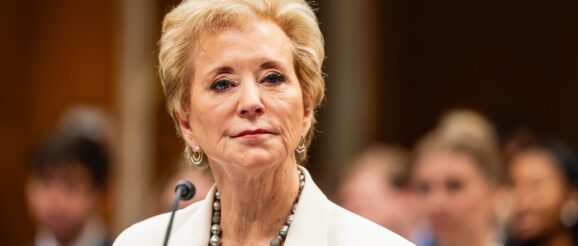US Education Secretary questioned on student loans, mental health


- The definition of insanity
In Tuesday’s Senate hearing, Sen. Markwayne Mullin, an Oklahoma Republican, asked McMahon, “What’s the definition of insanity?”
“Doing the same thing over and over again and expecting a different outcome,” McMahon answered.
The notion that U.S. students have been failing academically and that the Education Department is to blame has been Republicans’ leading argument in support of gutting the department, and it came up time and time again in this week’s hearings with McMahon.
Critics of that argument have noted that the department does not run the nation’s schools. It can’t tell districts or states what to teach or how to teach it.
- Colleges may be on the hook for student loans
When it comes to student loans, McMahon said colleges need to get “a little skin in the game.” She suggested that the federal government should not be responsible for all loans that go unpaid by students.
“Loans are not forgiven or just go away, they’re just shouldered by others,” she said.
A plan to force colleges and universities to repay a portion of the loans their students do not has been included in House Republicans’ big reconciliation bill. Republicans also want to make it clear when a given college program isn’t giving students a good return on their investment.
“If you want to get a student loan … you’ve got to go get a degree in something where actually you might be able to do something useful when you’re done with it,” said Rep. Randy Fine, a Florida Republican.
Such a shift would require significant changes to the student loan system and federal oversight of colleges.
In Tuesday’s Senate hearing, Democrats’ toughest questions for McMahon were about the department’s decision to stop paying out $1 billion in grants to school districts to hire mental health professionals, including counselors and social workers.
McMahon doubled-down on the department’s explanation of the funding freeze, that some of these programs were tainted by what the administration considers toxic DEI ideology.
She also said that “the states and the local areas, I think, are the best place where we need to concentrate for these particular programs.”
For example, the budget would fold federal funding for rural schools, students experiencing homelessness, literacy instruction and a host of other unrelated programs into one, generic bundle of money that would go to states.
- The fate of Upward Bound and the other TRIO programs
The department’s fiscal year 2026 budget would end a cluster of federal programs known collectively as TRIO, meant to help low-income and first-generation students access and succeed in college. And McMahon heard bipartisan support for TRIO and pleas to save the programs.
At one point during Tuesday’s hearing, Maine Republican Sen. Susan Collins pointed out that she was wearing a Maine TRIO pin on her lapel and that three of her staff members had gone through TRIO. Collins said she had seen first-hand how the programs had changed the lives of many vulnerable Americans for whom college might have otherwise been out of reach.
When asked by Collins why the administration thinks TRIO isn’t worth the investment, McMahon answered that the department of education lacks the ability to audit TRIO, to make sure the federal funding is being used appropriately.
Multiple senators voiced support for TRIO during the hearing and, at one point, New Hampshire Democrat Jeanne Shaheen told McMahon, “if there is a problem with accountability, let’s address that … but let’s not throw the baby out with the bathwater.”
- Who should pay for workforce programs?
The administration’s proposed consolidation of workforce-development programs was met with a range of responses, from slight apprehension to open hostility, from lawmakers from both parties.
McMahon did not answer the question with a yes or no, but continued to highlight the need for workforce development without the federal government shouldering the cost.
In a later exchange with a Republican representative, Mark Messmer of Indiana, Secretary McMahon said the administration was looking into expanding public-private partnerships for career and technical education.
She cited a program in West Virginia that is a partnership between community colleges and the car manufacturer Toyota. Students there train in the auto plant and take classes at the college to develop a built-in workforce funded by the employer, she said.
